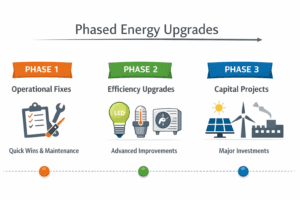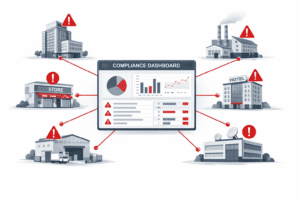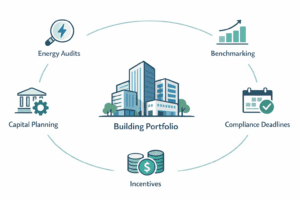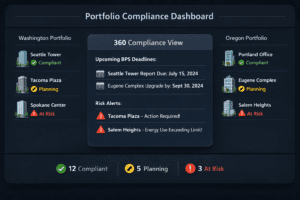As 2024 draws to a close, property owners and managers must review the year’s compliance landscape to prepare effectively for the future. This comprehensive overview highlights the 2024 compliance challenges and achievements, delves into the penalties for non-compliance, and previews the regulatory expectations for 2025. Through this article, our aim is not only to educate but also to position our company as a thought leader in the real estate sector, offering insights that will help property owners get ahead of 2025 compliance requirements.
2024 Compliance Review
Key Deadlines and Achievements
Throughout 2024, property owners faced several critical compliance deadlines, especially in areas related to energy efficiency and safety enhancements. Noteworthy among these was the implementation of stricter HVAC requirements aimed at reducing energy consumption. These standards compelled property owners to upgrade outdated systems, which, while initially costly, resulted in longer-term savings and operational efficiencies.
Another significant area was the enhancement of fire safety measures in response to updated building codes. These adjustments were not just about installing updated fire alarms or sprinkler systems but encompassed a comprehensive approach to safety, including improved building materials and escape route integrations.
Property owners who proactively met these standards not only aligned with legal requirements but also benefited from reduced insurance premiums and increased property valuations. For those still navigating these changes, Building Owners and Managers Association International provides a detailed insight into compliance strategies and benefits.
Penalties for Non-Compliance
The penalties for failing to comply with 2024 standards were substantial. These ranged from financial penalties such as fines and increased insurance rates to more severe operational restrictions, including limitations on tenant occupancy and delays in getting new building permits approved. For instance, properties not meeting the new energy standards might face restrictions on signing new leases, significantly impacting revenue potential.
These penalties underscore a broader shift towards stringent enforcement of compliance regulations, reflecting a growing emphasis on sustainability and safety across the real estate industry. Property owners can avoid these pitfalls by keeping informed through reliable sources such as the U.S. Environmental Protection Agency, which offers up-to-date information on compliance requirements and penalties.
Preview of 2025 Compliance
Emerging Regulations
As we look toward 2025, the emphasis on integrating sustainable practices and cutting-edge technology in property management is expected to intensify. One of the anticipated areas of focus is the integration of smart technology into building energy systems. These technologies not only promise to enhance energy efficiency but also provide property owners with real-time data to optimize energy use and reduce costs.
Additionally, there will likely be a stronger push towards renewable energy sources in building operations. This could mean regulations mandating or incentivizing the installation of solar panels or the integration of biodegradable, eco-friendly building materials in new constructions and renovations.
Early understanding and adoption of these new regulations can significantly benefit property owners. Resources like ENERGY STAR’s upcoming regulations page can provide preliminary guidance and anticipated standards.
What Property Owners Need to Do
1. Early Assessment and Upgrades
To stay ahead, property owners should start by assessing their current property’s compliance against the expected 2025 regulations. This would involve conducting detailed energy audits, evaluating the efficiency of current safety systems, and considering technological upgrades that align with future standards.
2. Educational Workshops and Training
Investing time in educational workshops and continuing training programs is crucial. These sessions not only keep property owners updated on regulatory changes but also provide practical insights into effective implementation strategies. Associations like the Real Estate Roundtable offer valuable workshops and seminars tailored to these needs.
3. Consultation with Compliance Experts
Working with compliance consultants can provide customized strategies that cater to specific property needs. These experts can offer in-depth insights and actionable recommendations that pave the way for smooth compliance transition and optimization of property management practices.
Strategic Planning for Future Compliance

Effective compliance management extends beyond mere adherence to regulations; it involves strategic integration into overall business operations. This strategic approach should consider long-term goals and the potential financial impacts of compliance-related investments.
For tools and strategic advice, property owners can turn to resources provided by the National Association of REALTORS®, which offer comprehensive guides on incorporating compliance into broader business strategies.
Conclusion
Transitioning from 2024 to 2025 is about much more than updating compliance strategies; it’s about adopting a forward-thinking approach to property management that embraces sustainability and technological advancements. By thoroughly reviewing the past year and preparing for the future, property owners can not only ensure compliance but also enhance the operational success and marketability of their properties.
Stay informed and prepared with ongoing insights and detailed guides from the Department of Energy’s website, which is an essential resource for any property owner looking to lead in compliance and sustainability in the real estate market.
VertPro.com offers tools and services to help property owners and managers improve building energy efficiency and meet regulatory standards. Whether you’re looking for instant pricing on energy audits, need support with benchmark compliance, or want to explore available building upgrade options, VertPro provides user-friendly technology solutions to simplify the process. Their platform helps ensure adherence to over 60 Energy Benchmarking and Efficiency Laws across the country.
For those looking to improve their property’s energy usage and operational value, VertPro.com provides a diverse array of tools and information. The site aims to facilitate a better understanding of energy efficiency practices and legislation, helping building owners and property managers make informed decisions about their energy strategies while complying with all energy ordinances and laws.
















